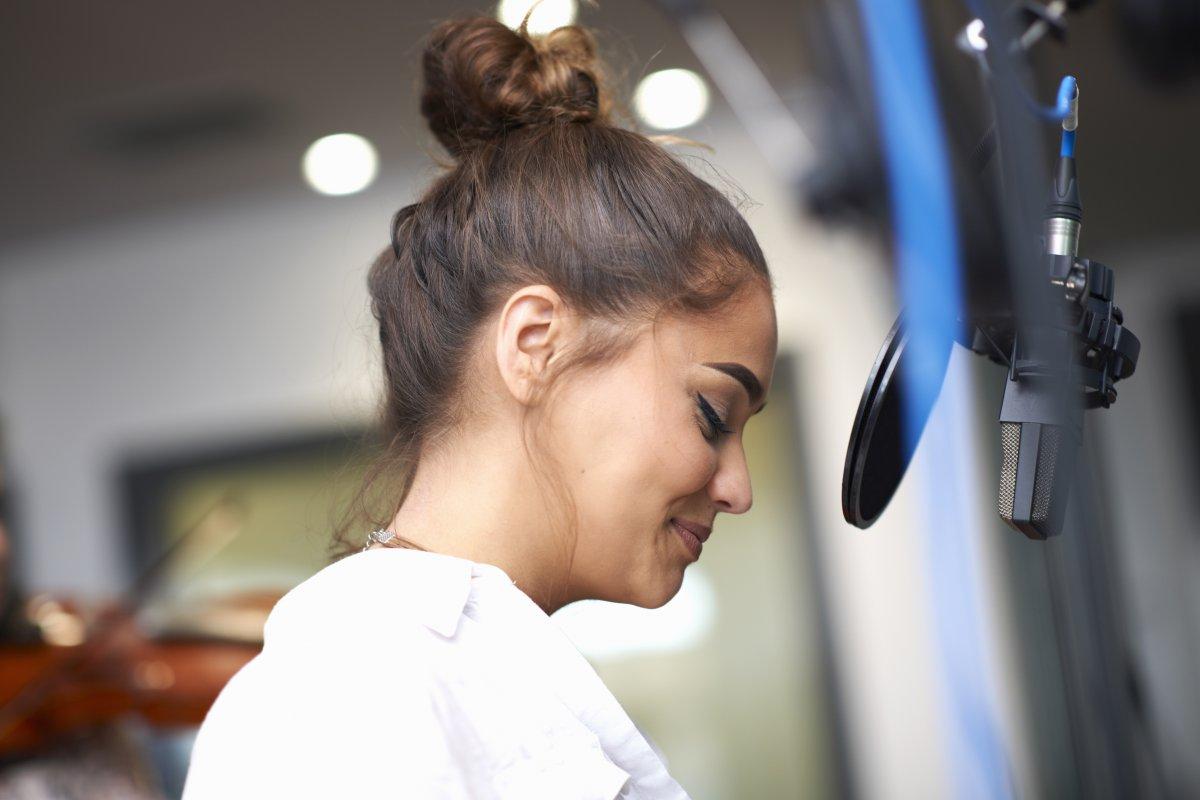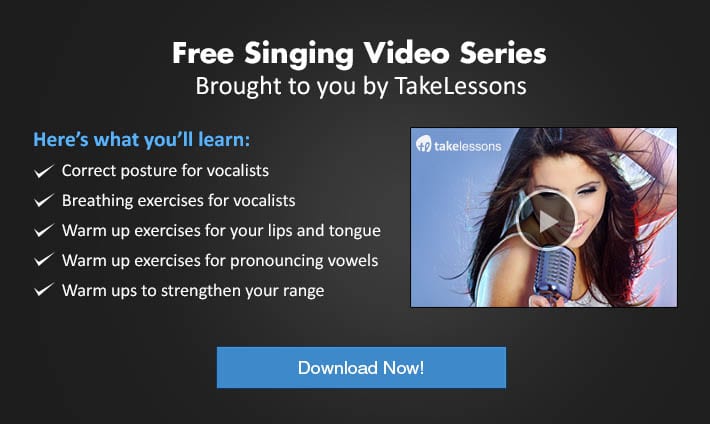Before you begin learning how to sing, you’ll need to find a teacher and schedule your voice lessons! But how often should you really be meeting with your instructor? Find out how to determine your needs & create your perfect schedule, with these recommendations from Forest Hills, NY and online teacher Claire W.:
Learning how to sing is an exciting journey. As you progress through vocal lessons, there are a few questions that will inevitably come up.
One of the most common questions is, “How often should I be taking singing lessons?” It’s a valid question and one that deserves some serious thought.
Let’s take a look at the great debate and find out what works best for you—and your vocal cords.
Do Singing Lessons Actually Work?
Do you want to learn how to sing? Have you heard about singing lessons but were unsure if they would actually work for you? Well, it’s a great question to ask:
- Singing lessons can certainly help improve your technique and range.
- They can also build confidence when performing in front of an audience. Knowing that you have the skills and techniques needed to perform will make all the difference.
- Plus, getting individualized instruction from an experienced singer or vocal coach can help you connect with your voice on a deeper level while offering personalized guidance specific to your unique needs.
So the answer is yes – singing lessons do indeed work when used in combination with practice, dedication, and commitment!
Still not convinced about whether beginner singing lessons are right for you? Why not sign up and give them a try – you have nothing to lose! Check out the video below for even more information on how singing lessons can help you improve:
https://www.youtube.com/watch?v=huqdwhVX9TI
Types of Singing Lessons to Consider
You know that singing is your passion, but you want to make sure you’re getting the best lessons available. Whether you’re a beginner or an experienced singer, there are a variety of options when it comes to finding the right singing lesson for you. Let’s take a look at some of the different types of singing lessons out there and what might be the best fit for you.
Online Singing Lessons
Online singing lessons are perfect for people with busy schedules who don’t have time to attend in-person classes. With online singing lessons, you can get personalized instruction from experienced teachers from the comfort of your own home. Plus, you don’t have to worry about getting stuck in traffic or missing classes due to illness or other commitments.
Free Singing Lessons
If cost is an issue, then free online singing lessons might be just what you need. There are many websites offering free tutorials and exercises designed to help singers develop their skills without breaking the bank. Just remember that these free online resources can only take you so far; if you want to really hone your craft, then investing in professional instruction may be worth it down the road.
Singing Lessons App Options
If convenience is key for you, then look no further than a singing lessons app! There are several apps available on both Android and iOS devices that provide detailed vocal instruction from professional instructors. And since they’re mobile-friendly, all you need is your phone or tablet and an internet connection — it couldn’t be easier!
Singing Lessons for Kids
If your little one has expressed interest in learning how to sing, there are plenty of great options available! From group classes held at local music schools to private tutoring sessions with experienced instructors, there are plenty of ways for kids to learn proper technique and gain confidence behind the mic.
Adult Singing Lessons Near Me
Finally, if what matters most is being able to get quality instruction without having to leave town, then adult singing lessons near me might just be your best bet! Many cities offer great music schools where adults can learn everything from breathing techniques and vocal exercises to songwriting and performance tips — all taught by experienced professionals who truly care about helping their students succeed.
Can I Teach Myself to Sing?
So, can I teach myself to sing? The answer is yes—you absolutely can! But before you jump into the deep end, there are a few things you should know. First off, it takes time. Just like any new skill or hobby, learning how to sing takes practice and patience. Don’t expect yourself to sound like Adele after one session! Start small and stay consistent.
Second, keep an open mind and listen carefully. If a vocal coach gives you tips or advice that doesn’t feel right at first, take the time to really think about why they said what they did—it might make more sense once you understand the reasoning behind it.
And don’t forget that your ears are one of the most important tools when it comes to singing; practicing with headphones on can help sharpen your ear for pitch accuracy.
Finally, learn proper technique from the start. Developing good habits from day one will make learning easier down the road—and save your voice from unnecessary strain in the long run! Take classes or private lessons if possible; having an experienced teacher guide your progress can be invaluable.
Of course, there are lots of great online resources available too; YouTube has tons of helpful videos for beginners looking to take their vocal game up a notch.
Best Singing Lessons Schedule – from Beginner to Advanced
Working your way toward learning how to sing means gaining control of your voice and refining your ability to express yourself with song. It can be a challenging task, but as the saying goes, “Nothing worthwhile is ever easy.” Depending on your personal goals, learning how to sing can be a very long-term project. Because there are so many aspects to the skill, the frequency of your lessons depends on the goal you want to work toward and how fast. Keep in mind though, that developing the ability to sing on key and with control of your voice and breathing for a range of genres requires a bit of muscle and memory training.
Any kind of music – especially the type that uses your very own body as an instrument – is extremely cerebral, and requires you to manage and control many different variables at once. But you can do it, and if you ever doubt yourself and think “I’m tone deaf! This is impossible?!”, do keep in mind that tone-deafness is actually a recessive trait in humans, so your chances of actually being tone-deaf are low. This article will discuss the suggested frequency of your training per (1) type of training and (2) level of musical proficiency so that you can learn how to sing.
Beginner Singing Lessons-Intermediate Singing Lessons
If you are a beginner at music, the first and foremost highest leverage thing for you to do when learning how to sing is to invest a lot of time in recognizing and copying the production of sounds from another instrument and identifying their names and tonal values. For example, as a helpful exercise your teacher might: (1) play a note for you, (2) tell you what its numeric or syllabic value is, and (3) give you feedback when you try to produce the exact sound with the number or syllable. You can benefit immensely from having ear training lessons once or twice a week, in addition to or in combination with a weekly voice lesson. Later on, more advanced ear training has you identify and reproduce the relationships between two tones or three tones in intervals, broken chords, or scales.
Have patience with yourself, and expect the first few tries to be rocky, but don’t give up! Remember you are literally training the synapses of neurons to form for sound recognition and reproduction. Because of this, frequent repetition of this training is highly recommended for all levels. Ear training is the first step in becoming a strong singer of any genre or style, and is something that all musicians and singers practice—even when they are at a professional level. I would suggest 60 minutes of ear training once a week until recognizing and reproducing tones or simple intervals becomes natural and automatic.
Intermediate to Professional Level Singing Lessons
If you are at an intermediate level of musical proficiency, learning how to sing will be much easier, because you’ve probably done a lot of ear training already. Now it’s time to populate your understanding of song with a lot of data. By data, I mean practicing songs from different genres and refining your understanding of your pitch range, sweet spots, and breaks in your voice. Once you are at an intermediate level, most students can move from ear training to focusing all on singing during your weekly lessons. One lesson a week however, does not excuse you from practicing for at least 30 minutes every day! When you practice on your own, you’ll be able to figure out how identify the little basic things in a voice that make an audience feel a certain way. The length of your lessons will depend on a few different factors.
Professional Level Singing Lessons
Eventually, you’ll have gotten so much feedback, practiced so many songs, and listened to so many genres that you’ll be singing at a professional level. Huzzah! I can’t wait to see singing stars popping up and talking about this article being their inspiration to become singing stars. Keep in mind that even professionals still work with vocal coaches to continue improving – even it’s just once a month or so.
How Much Are Singing Lessons?
Singing lessons can be of great benefit for those looking to improve their vocal techniques, develop better breath control, and become stronger performers.
The cost of singing lessons can vary drastically as instructors typically set their own rates based on the level of experience, location and types of teaching methods used.
Generally speaking, prices can range anywhere from $25 an hour to more than $250 an hour depending on the instructor’s qualifications and the geographical area in which the lesson will take place.
Before committing to a particular instructor for voice training, it may be worth investigating different teachers in order to find the most cost effective solution that fits your particular needs.
What Age is Too Late for Singing Lessons?
There is no such thing as too late when it comes to taking singing lessons. Whether you are looking to take up a hobby, audition for a school musical or hop on stage for karaoke at your local bar, starting singing lessons can be an incredibly rewarding experience at any age.
People of all skill levels and musical backgrounds can benefit from learning proper vocal technique and basic music theory concepts.
In addition to the technical aspects of singing, there are some important personal benefits that come with taking vocal lessons – increased self confidence, improved public speaking skills, expanded creativity – just to name a few!
So if you’ve been considering lessons and you’re wondering if it’s too late in life to start learning, the answer couldn’t be more simple: it’s never too late!
After all, learning how to sing is like learning how to read, write, or speak. At a certain point, you’re just expanding your grasp of the expressive ‘vocabulary’ (e.g. a crescendo, diminuendo, or a trill) and eventually, you get to the point of familiarity that you start creating new vocal conventions and styles of your own, whether you’re drawing inspiration from Beyoncé or Pavarotti. Always go through cycles of practice and rest, otherwise you can tire out your voice. Even Beyoncé has to do this! Grit through the beginner phase and you’ll be singing like a star in no time. Remember, everybody’s voice ends up being beautiful in the right context and there are so many genres to be appreciated, so never give up, find your sound, and keep on right on singing.

Claire W. teaches music and tutors in Forest Hills, NY, as well as online. As a recent graduate of Columbia University, she majored in Applied Statistics and Psychology, and earned her Texas State Teachers Certification in 2014. Learn more about Claire here!
Photo by michael_swan
Suzy S.

